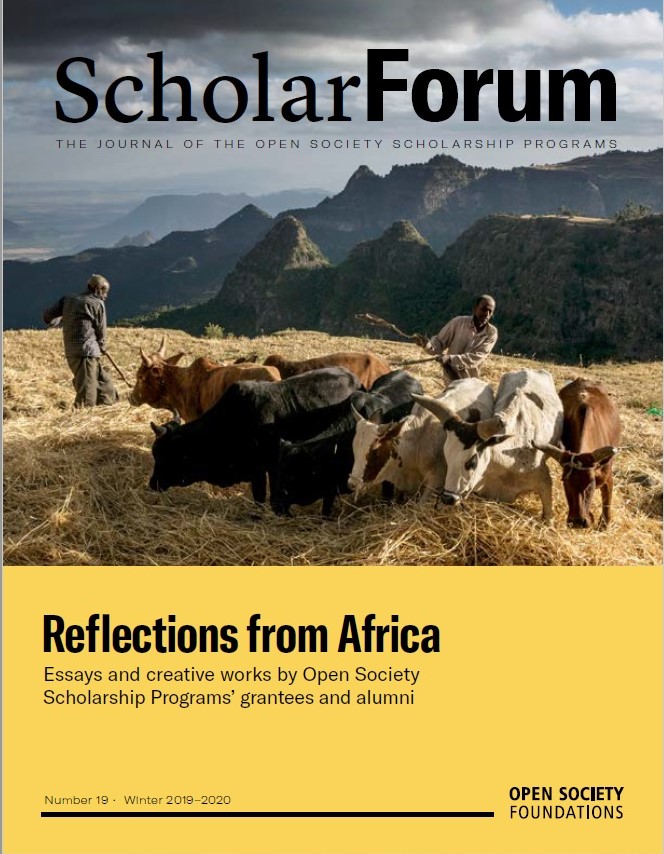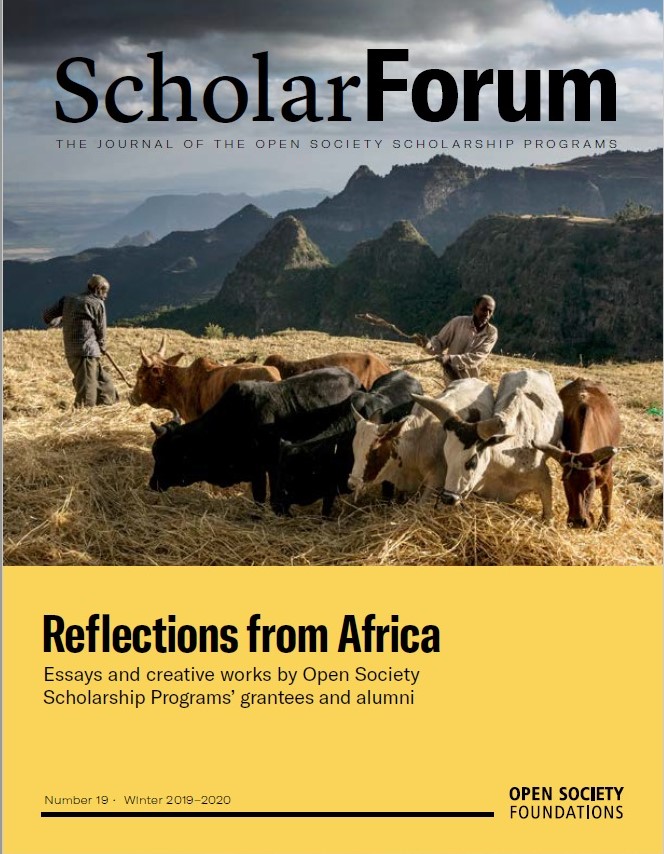ScholarForum creates a space for grantees and alumni to learn from each other. In this edition, we talked with two alumni, Danil Nikitin, a former fellow from the Social Work Fellowship Program, and Aleksandr Pugachev, an Open Society Chevening University of Edinburgh Awards recipient, about their work with their nonprofit organization, the Global Research Institute, or GLORI, in Kyrgyzstan.
ScholarForum (SF): Danil and Aleksandr, tell us a little about why you started the Global Research Institute (GLORI Foundation). What were your initial hopes for the organization when you started?
Aleksandr Pugachev (AP): We started GLORI to provide a platform that brings together a multidisciplinary team of international and local experts and activists to find solutions to health and social disparities in Kyrgyzstan, and Central Asia more broadly. At GLORI, we strongly believe that research can improve quality of life, and so we use data to inform changes and promote democracy. Scientific evidence gives much more weight to our work. We know that our interventions save lives and empower those who need support. This is what we hoped to achieve when we started GLORI back in 2008.
SF: Can you briefly describe a project you have taken on? What impact have you seen on the target populations?
Danil Nikitin (DN): Among the dozens of projects that we have managed so far, it is the WINGS of Hope project that has global recognition. For three years, the project provided high-quality, gender-based violence prevention services to 213 women in Kyrgyzstan who use drugs, provide sex services, or who are vulnerable to violence. The specific needs of these women have been continually ignored. The participants had several issues, including having lost personal identification documents like birth certificates that jeopardized access to health services for them and their children. These are women who cannot get treatment or stop using drugs right away or have lasting problems from their younger years. The women reported violence against them, including being kicked, slammed against walls, or forced to have sex, sometimes unprotected.
AP: We like to share the story that the project’s name — WINGS of Hope —was proposed by participants. Early on in the project, we held a focus group with sex workers in southern Kyrgyzstan, and it was during this meeting that the idea for the name came up. The English abbreviation of WINGS stands for Women Initiating New Goals for Safety. The name stuck because, among the other things, our team wanted to find a project name that would not focus on violence. This was important from the point of view of the safety of participants and staff. Additionally, the name is uplifting.
DN: The WINGS model uses the well-known social work SBIRT approach, which stands for Screening, Brief Intervention, and Referral to Treatment. Women are screened to identify their risk of becoming a victim of violence, followed by an intervention aimed at motivating and improving the participant’s emotional state, and developing a safety plan. They are then referred to appropriate service providers by project staff. They also set goals for the immediate future and have access to HIV testing and counseling. We found out through a three-month follow-up survey that participants experienced significantly fewer intimate partner and gender-based violence incidents, and a significant reduction in drug use. They also reported an increased ability to negotiate safe sex practices, and increased access to gender-based violence related services they had learned about through the project. For us, there is no doubt that WINGS of Hope improves the lives of the women participating in it. The WINGS model is being adapted and piloted in Georgia, India, Nepal, and Ukraine. We aim to promote the model in other countries as well.
SF: How do you decide which projects GLORI should engage?
DN: A combination of adhering to the mission and, to be honest, a gut feeling about whether it is a good fit. When we see that there is injustice, an intolerance for diversity, or an inequality that causes suffering, we decide how much we can do about that.
AP: We do not engage in projects where the outcomes will not be beneficial to the community, even if there is great pressure to do so.
SF: Has there been one particular collaboration that has succeeded because of your fellow alumni?
DN: The most crucial and fruitful collaboration in GLORI’s development has been with the Global Health Research Center of Central Asia, an organization co-run by alumni from the Open Society Social Work Fellowship Program. Together with the center, we have managed several regional projects that helped vulnerable people, such as the USAID-funded Project CARAVAN that examined the prevalence and risk factors for tuberculosis among returning labor migrants in Kyrgyzstan and other Central Asian countries.
AP: While working with the center, we learned a lot from each other. We studied, for example, the whole spectrum of challenges that impede migrants’ access to diagnostic and treatment services in their destination countries, and we were able to propose practical solutions that agencies that work with migrants are now piloting. For instance, we have seen that the engagement of both the community and religious leaders in designing and co-facilitating health-related trainings for migrants significantly increased their effectiveness. Also, due to our advocacy, policy changes were initiated that aim at minimizing migrants’ risks of being deported because of issues with their health. We see that more and more people are sharing our view that people suffering illness deserve support rather than punishment.
SF: GLORI has a mission to address many issues that often affect a region’s or country’s most marginalized communities Which do you see as being a priority for Kyrgyzstan in the coming year and why? What do you hope GLORI can contribute to addressing these issues?
DN: Experts see lots of challenges for Kyrgyzstan, and it’s not possible to come up with a universal solution to all of them. GLORI will continue working in several health-related areas, primarily intensifying our work in adapting and piloting high-quality research models and disseminating significant findings. In general, it seems feasible to focus on strengthening civil society and integrating communities into the policy development and decision-making processes. Civil society in Kyrgyzstan is more developed than in other Central Asian countries, and there are wonderful, highly committed experts and activists who are prepared to contribute their experience to the growth of a fairer and more transparent society. We believe that Kyrgyz civil society will be a model for other countries of the former Soviet Union where activists and organizations have a desire to bring change to their communities.
SF: If you could give one piece of advice to newly graduating Open Society scholars, what would it be? Are there strategies you can share about making an impact in your communities?
AP: If you applied for an Open Society scholarship and decided to share Open Society’s vision of the ways the world can develop, then believe in your excellence. Networks are important, and we are a group of well-educated activists across the world: call us, ask us, involve us.
DN: For me, your projects will be more successful if you are able to promote partnerships between civil society organizations in your communities and leading universities where you had the privilege to study. You can start building these relationships when you are on your scholarship, and reinforce these contacts again after you return home.
Danil Nikitin and Aleksandr Pugachev are co-directors of the Global Institute for Research (GLORI Foundation), a Bishkek-based
nongovernmental organization focusing on collaborative projects and evidence-based research to find solutions to pressing health
and social issues in Central Asia. More information is available through their website: https://glori.kg/en/glori/about-the-foundation/
This interview is a part of the ScholarForum issue that can be downloaded from the website of the Open Society Foundations via the link below:



















